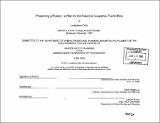| dc.contributor.advisor | Susan Silberberg. | en_US |
| dc.contributor.author | Ortiz, Larisalena, 1975- | en_US |
| dc.contributor.other | Massachusetts Institute of Technology. Dept. of Urban Studies and Planning. | en_US |
| dc.coverage.spatial | nwpr--- | en_US |
| dc.date.accessioned | 2012-02-29T17:27:48Z | |
| dc.date.available | 2012-02-29T17:27:48Z | |
| dc.date.copyright | 2003 | en_US |
| dc.date.issued | 2003 | en_US |
| dc.identifier.uri | http://hdl.handle.net/1721.1/69446 | |
| dc.description | Thesis (M.C.P.)--Massachusetts Institute of Technology, Dept. of Urban Studies and Planning, 2003. | en_US |
| dc.description | Includes bibliographical references (p. 157-162). | en_US |
| dc.description.abstract | Since the 1980's, Puerto Rican development has been marked by low-density automobile-oriented growth, and commercial decentralization. This type of growth has increasingly put Puerto Rico's traditional downtowns, or 'pueblos,' at risk of continued abandonment as people and businesses move to the suburbs. The result has been increased residential and commercial vacancies, a redundancy in physical infrastructure that Puerto Rico can ill afford to support, and the continued loss of natural, architectural and cultural heritage resources. The goal of this thesis is to prevent the further demise of Puerto Rico's pueblos by providing a model for the revitalization of Guayama, Puerto Rico, a community of 45,000 people located about 40 miles south of San Juan, the capital city. Guayama remains one of Puerto Rico's most vibrant pueblos, yet the decline of downtown is unmistakable. Abandoned homes and empty commercial spaces are common. However, Guayama's relative strength compared to other pueblos means it has the potential to lead Puerto Rico in a series of innovative downtown development strategies aimed at reversing this slow decline. Working from analysis of Puerto Rican economic conditions, Guayama's own strengths and weaknesses, and case studies, this thesis culminates in a work plan based on three guiding principles: the preservation and celebration of Guayama's heritage and culture; the support of local businesses, and a better downtown for the pueblo's resident population. This vision is supported through recommendations that develop local institutional capacity and increase local and visitor demand. Institutional capacity, or the ability of local organizations to develop and implement revitalization strategies, forms the backbone of this thesis. Case studies suggest that a downtown coordinator and a relatively independent downtown organization are important components of successful revitalization initiatives. They provide formal opportunities for private sector involvement in local development while simultaneously creating a strong local mechanism for implementation. Guayama's strong cultural heritage and proximity to nature reserves form the foundation for strategies aimed at increasing visitor demand through "Heritage Tourism." Attracting people to the region's numerous cultural and historic sites, many of which are related to the region's sugar cane history, requires close partnerships with local municipalities and commonwealth institutions. A downtown coordinator can also help Guayama lead such a regional partnership initiative. Combining strong institutional capacity with recommendations aimed at increasing local and visitor demand for Guayama's goods and services will result in a pueblo full of energy and vitality, where people continue to live, work, shop and visit. Guayama's success, in turn, will serve as a model for other Puerto Rican pueblos interested in revitalizing their own communities. | en_US |
| dc.description.statementofresponsibility | by Larisalena Ortiz. | en_US |
| dc.format.extent | 162 p. | en_US |
| dc.language.iso | eng | en_US |
| dc.publisher | Massachusetts Institute of Technology | en_US |
| dc.rights | M.I.T. theses are protected by
copyright. They may be viewed from this source for any purpose, but
reproduction or distribution in any format is prohibited without written
permission. See provided URL for inquiries about permission. | en_US |
| dc.rights.uri | http://dspace.mit.edu/handle/1721.1/7582 | en_US |
| dc.subject | Urban Studies and Planning. | en_US |
| dc.title | Preserving a pueblo : a plan for the future of Guayama, Puerto Rico | en_US |
| dc.type | Thesis | en_US |
| dc.description.degree | M.C.P. | en_US |
| dc.contributor.department | Massachusetts Institute of Technology. Department of Urban Studies and Planning | |
| dc.identifier.oclc | 52989560 | en_US |
